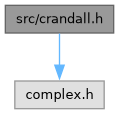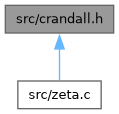Calculates the summand function G and related functions in Crandall's formula. More...
#include <complex.h>
Include dependency graph for crandall.h:

This graph shows which files directly or indirectly include this file:

Go to the source code of this file.
Functions | |
| double complex | crandall_gReg_nuequalsdim (double s, double arg, double k, double lambda) |
| Calculates the regularization of the zero summand in the second sum in Crandall's formula in the special case of nu = dim + 2k for some natural number k. | |
| double complex | crandall_gReg (unsigned int dim, double nu, const double *z, double prefactor) |
| Calculates the regularization of the zero summand in the second sum in Crandall's formula. | |
| double | assignzArgBound (double nu) |
| calculates bounds on when to use asymptotic expansion of the upper incomplete gamma function, depending on the value of nu. | |
| double complex | crandall_g (unsigned int dim, double nu, const double *z, double prefactor, double zArgBound) |
| Assumes x and y to be in the respective elementary lattice cell. Multiply with exp(2 * PI * i * x * y) to get the second sum in Crandall's. | |
Detailed Description
Calculates the summand function G and related functions in Crandall's formula.
Function Documentation
◆ assignzArgBound()
| double assignzArgBound | ( | double | nu | ) |
calculates bounds on when to use asymptotic expansion of the upper incomplete gamma function, depending on the value of nu.
- Parameters
-
[in] nu exponent of the regularized Epstein zeta function.
- Returns
- minimum value of z, when to use the fast asymptotic expansion in the calculation of the incomplete upper gamma function upperGamma(nu, z).
◆ crandall_g()
| double complex crandall_g | ( | unsigned int | dim, |
| double | nu, | ||
| const double * | z, | ||
| double | prefactor, | ||
| double | zArgBound ) |
Assumes x and y to be in the respective elementary lattice cell. Multiply with exp(2 * PI * i * x * y) to get the second sum in Crandall's.
- Parameters
-
[in] dim dimension of the input vectors. [in] nu exponent of the regularized Epstein zeta function. [in] z input vector of the function [in] prefactor prefactor of the vector, e. g. lambda or 1/lambda in Crandall's formula
- Returns
- upperGamma(nu/2,pi prefactor * z**2) / (pi * prefactor z**2)^(nu / 2) in
◆ crandall_gReg()
| double complex crandall_gReg | ( | unsigned int | dim, |
| double | s, | ||
| const double * | z, | ||
| double | prefactor ) |
Calculates the regularization of the zero summand in the second sum in Crandall's formula.
- Parameters
-
[in] dim dimension of the input vectors [in] s dimension minus exponent of the regularized Epstein zeta function, that is d - nu [in] z input vector of the function [in] prefactor prefactor of the vector, e. g. lambda
- Returns
- - gamma(s/2) * gammaStar(s/2, pi * prefactor * z**2), where gammaStar is the twice regularized lower incomplete gamma function if s is not equal to - 2k and (pi * prefactor * y ** 2) ** (- s / 2) (gamma(s / 2, pi * prefactor * z ** 2) + ((-1)^k / k! ) * (log(pi * y ** 2) - log(prefactor ** 2))) if s is equal to - 2k for non negative natural number k
◆ crandall_gReg_nuequalsdim()
| double complex crandall_gReg_nuequalsdim | ( | double | s, |
| double | arg, | ||
| double | k, | ||
| double | lambda ) |
Calculates the regularization of the zero summand in the second sum in Crandall's formula in the special case of nu = dim + 2k for some natural number k.
- Parameters
-
[in] s dimension minus exponent of the regularized Epstein zeta function. [in] arg input of the function [in] k k = - s / 2 = (nu - d) / 2 as an integer [in] lambda scaling parameter of crandalls formula
- Returns
- arg ** (- s / 2) * (gamma(s / 2, arg) + ((-1)^k / k! ) * (log(arg) - log(lambda ** 2))